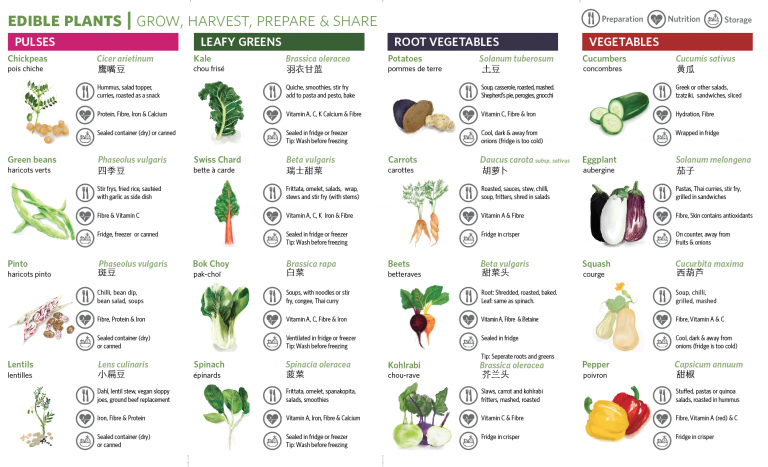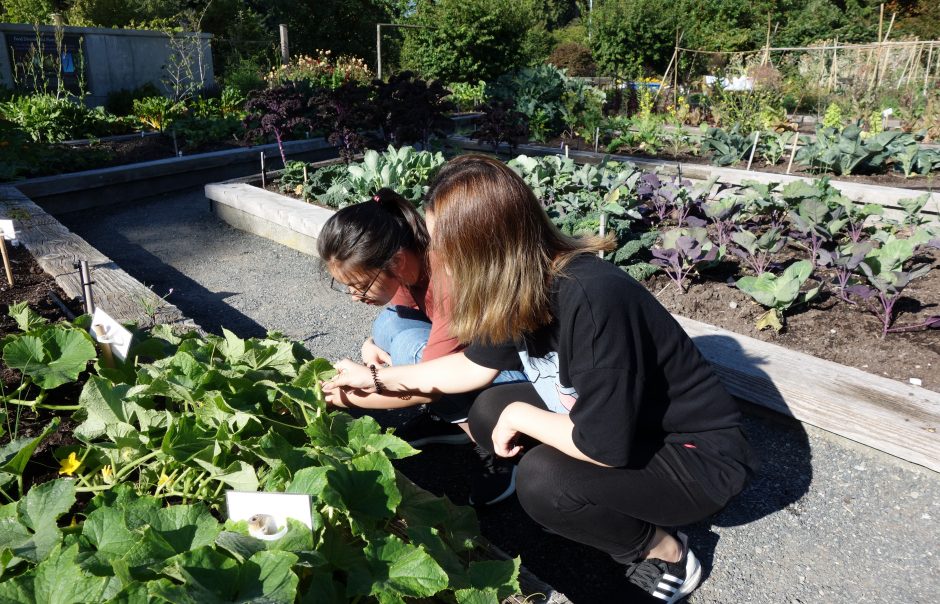UBC Botanical Garden is working with student partners to bridge the gap between students and food security, an issue that is prominent not only on UBC’s Vancouver campus but across the world.
With student partners from the AMS Food Bank and the Food and Nutrition Working Group from UBC Wellbeing, UBC Botanical Garden co-created the Harvesting Food Skills Program with funding support from UBC Wellbeing. The project was designed to provide AMS Food Bank clients with the workshops and resources to build capacity around the growing, harvesting, preparing and sharing of food.
“[Harvesting Food Skills] is about making food, agriculture and nutrition research and programming accessible to our students so that we can advance food security on campus,” said Tara Moreau, Associate Director of Sustainability and Community Programs at UBC Botanical Garden.

Students learn food skills in a Harvesting Food Skills workshop at UBC Botanical Garden this past summer.
Equipping students to develop their food literacy skills
The Harvesting Food Skills Program program has two components. The first is a series of summer workshops that first ran in 2018. Clients from the AMS Food Bank were invited to the Food Garden at UBC Botanical Garden, where participants learned how to grow and harvest food plants, then how to prepare and cook them. At the end of the workshops, participants shared their dishes and were invited to take with them freshly harvested produce.
Basic food skills are lacking within the student body. One student at the workshops had never sauteed onion before. The workshops provided students with the skills to start building their understanding of food by teaching them how to incorporate healthy ingredients in their kitchens.
The Harvesting Food Skills Program teaches students how to grow, harvest, prepare, and share plant-based meals.
The second component of the Harvesting Food Skills Program is the development of a brochure and poster with the theme: Food: Nutritious Plants for Health and Wellbeing. The brochure features plant-based diets and tips for healthy eating, while highlighting a series of student-developed illustrations of plant foods and tips for using these ingredients in the kitchen.

UBC Botanical Garden’s new Food Guide Brochure. Download the brochure.
The value of the brochure is that students can take the brochures home, where it can act as a permanent healthy eating resource. Additionally, the cooking tips and nutritional information provided by the poster may also inspire students to choose new and different vegetables at the Food Bank that they previously were unaware of how to prepare.
These resources aim to equip students to be critical thinkers about where their food comes from, asking questions about how they can eat healthier and cook more.

Masters of Geomatics for Environmental Management (MGEM) students study a patch of plants at UBC Botanical Food Garden.
Community gardens as entrances to the food movement
The food movement is manifesting on national and global scales. At the national level, Canada’s new Food Guide was released in January 2019. The guide encourages consumers to “choose protein foods that come from plants more often,” supporting the surge of plant-based diet trends.
Moreau believes that community gardens act as entry points in getting people started to think critically about their food choices, and consequently, about larger food and agriculture systems.
“To me, the reason why plant-based diets are so great is that we [the Garden] can share with other people our love of plants through the important topic of food security,” said Moreau.
From a global standpoint, the EAT-Lancet report, released in January 2019, reiterates the value of plant-based diets in improving both human health and environmental health. The report notes that improving food systems will help achieve the United Nations Sustainable Development Goals (SDGs).
The Harvesting Food Skills program aims to celebrate the opportunities of plant-based meals and diversity of food plants available to eat. It aims to be an experience forpeople to think about food choices, healthly lifesytels , and biodiversity in ways that grow community and connections to land.
“Local gardens can grow global goals by aligning to worldwide initiatives like the United Nations SDGs,” said Moreau.
Like UBC Botanical Garden, organizations looking to incorporate sustainability initiatives can integrate important global issues into their existing work and contribute meaningfully towards a better future.
Submitted by: Braela Kwan, Former UBC Botanical Garden Marketing and Communications student employee and Master of Journalism student.
